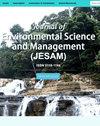Towards a Balanced Assessment of the Viability of Nuclear Energy in the Philippines
IF 0.3
4区 环境科学与生态学
Q4 ENVIRONMENTAL SCIENCES
引用次数: 1
Abstract
Nuclear energy in the Philippines has been thrust into the spotlight by the administration of President Duterte. A committee created by Executive Order 116 was tasked to formulate a national position on a possible nuclear program. For nuclear energy to be a sustainable alternative, it must be accepted by society at large. Conventional wisdom surrounding the Bataan Nuclear Power Plant (BNPP) has branded this project as a white elephant leading to rejection of nuclear energy among a significant number of Filipinos, particularly members of civil society. This study presents evidence that the BNPP was operational at the time the administration of President Corazon Aquino decided to shut it down. Moreover, the risks related to the BNPP’s location are largely inconsequential. The BNPP became a white elephant because of an ill-advised political decision. Evaluating the viability of nuclear energy in the Philippines should therefore be balanced and deal solely with underlying technical and scientific issues, which are well known. Meanwhile, the role of nuclear energy in promoting a low-carbon society must be re-evaluated because of the sharp decline in the cost of variable renewable energy (VRE). If nuclear energy will eventually be incorporated in the plans of the Department of Energy (DOE), building a new large reactor would be too expensive. Two options are more feasible: revive the BNPP and/or invest in small module reactors (SMRs). Even if the latter has not yet been mainstreamed in the global energy market, SMRs are already on the radar of the DOE对菲律宾核能可行性的平衡评估
在杜特尔特总统的领导下,菲律宾的核能成为人们关注的焦点。第116号行政命令成立了一个委员会,负责就可能的核项目制定国家立场。核能要想成为一种可持续的替代能源,就必须为整个社会所接受。围绕巴丹核电站(Bataan Nuclear Power Plant, BNPP)的传统观点将该项目打上了白象的烙印,导致相当多的菲律宾人,尤其是民间社会成员拒绝使用核能。这项研究提供的证据表明,在总统科拉松·阿基诺(Corazon Aquino)政府决定关闭BNPP时,BNPP仍在运行。此外,与BNPP位置相关的风险在很大程度上是无关紧要的。由于一个不明智的政治决定,BNPP成为了一个累赘。因此,评估菲律宾核能的可行性应该是平衡的,并且只处理基本的技术和科学问题,这是众所周知的。同时,由于可变可再生能源(VRE)成本的急剧下降,必须重新评估核能在促进低碳社会中的作用。如果核能最终被纳入美国能源部(DOE)的计划,那么建造一个新的大型反应堆将过于昂贵。有两种选择更为可行:重启BNPP和/或投资小模块反应堆(smr)。即使后者尚未成为全球能源市场的主流,小型反应堆已经在美国能源部的雷达上
本文章由计算机程序翻译,如有差异,请以英文原文为准。
求助全文
约1分钟内获得全文
求助全文
来源期刊

Journal of Environmental Science and Management
ENVIRONMENTAL SCIENCES-
CiteScore
0.90
自引率
0.00%
发文量
10
审稿时长
2 months
期刊介绍:
The Journal of Environmental Science and Management (JESAM) is an international scientific journal produced semi-annually by the University of the Philippines Los Baños (UPLB).
JESAM gives particular premium to manuscript submissions that employ integrated methods resulting to analyses that provide new insights in environmental science, particularly in the areas of:
environmental planning and management;
protected areas development, planning, and management;
community-based resources management;
environmental chemistry and toxicology;
environmental restoration;
social theory and environment; and
environmental security and management.
 求助内容:
求助内容: 应助结果提醒方式:
应助结果提醒方式:


